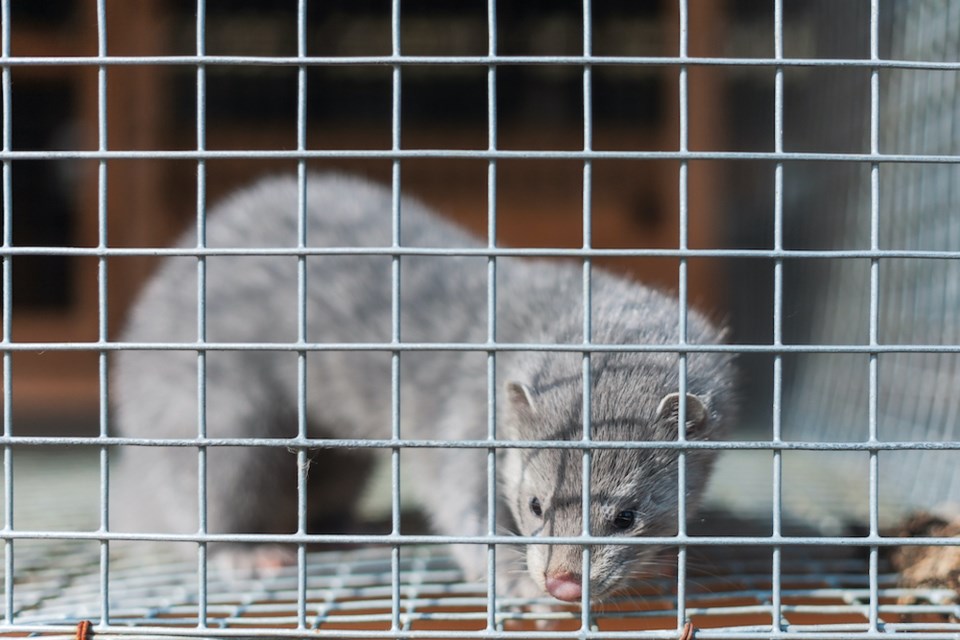"Our call to action is not in contempt of mink farm operators as individuals; instead, it is a call to action to end a practice we have outgrown as a society."
Environmental icon David Suzuki and four other scientists are calling on the Canadian government to put an end to fur farming in the country.
In a letter addressed to Lana Popham, B.C.’s Minister of Agriculture and Katrine Conroy, B.C.’s Minister of Forests, Lands, Natural Resources and Rural Development, the scientists list three concerns that they state are reason enough to end fur farming in the province:
- Mink farms are risking the spread and mutation of SARS-CoV-2 among people.
- Mink farms risk wildlife populations.
- Mink farming raises serious animal welfare concerns.
The letter notes that "Mink are particularly susceptible to [COVID-19}, with severe symptoms. Not only have outbreaks on mink farms across the globe led to substantial animal suffering, but they have also increased the reservoir size for this virus, increasing the risk of mutations and spread back to humans and other wildlife."
Since mink are also highly intelligent animals who typically roam, swim, and forage over a large territory, keeping them confined to small, packed cages is inherently cruel, the scientists argue. "Confining wild, far-ranging, solitary, and semi-aquatic carnivorous animals to small cages causes them extreme stress and frustration, as measured in numerous scientific studies."
Animal rights groups launch petitions following COVID-19 outbreak on B.C. mink farms
In late 2020, outbreaks of COVID-19 were declared at mink farms in the Lower Mainland and around the world. The B.C. Ministry of Agriculture, Food and Fisheries confirmed that test results from mink samples taken from Fraser Valley farms were confirmed positive for SARS-CoV-2, the virus that causes COVID-19 in humans.
The incidents raised concern about the ethical and environmental ramifications of fur farming in Canada, and both the BC SPCA and The Fur-Bearers--a charitable organization that works to end the commercial fur trade--launched petitions to end the practice.
Provincial Health Officer Dr. Bonnie Henry has also stated that the outbreaks on the local mink farms are of "great concern."
Lesley Fox, executive director of The Fur-Bearers told Vancouver Is Awesome in a previous interview that this type of outbreak isn't unexpected given the conditions on fur farms.
Fox said fur farms are "problematic for animals, the environment, and human health," regardless of the type of animals being farmed.
"On one farm you have tens of thousands of individuals--and the keyword is individuals. And so, when you have one of those individuals that's sick, the capacity to spread that virus is certainly a domino effect," explains Fox.
Canadian Views on Fur Farming
Recently, Research Co. polled North Americans on several issues related to animals. The support for killing animals for their fur was extremely low, with the overwhelming majority--81 per cent of Canadians and 75 per cent of Americans--opposed to killing animals for their fur.
The highest support for the practice was in Atlantic Canada (30%), followed by Saskatchewan and Manitoba (26%), Alberta (20%), Quebec (19%), Ontario (16%) and British Columbia (12%).
In Denmark, the Guardian writes how a rushed cull of minks after a massive outbreak has resulted in deceased mink "rising from their graves" after they were buried in shallow pits and their postmortem, bloated bodies rose up from the earth.
While there is a market for mink in Canada, the majority of the pelts are sold overseas. However, there are several salons in the Lower Mainland that offer "mink eyelashes."
"The contrast between these so-called luxury items and the suffering, and the devastation that this industry causes, couldn't be greater," Fox underscored.
The letter to the Ministry of Agriculture points out that "Keeping native wildlife in captivity is strictly prohibited by the BC Wildlife Act, with an exception granted for the fur industry to operate under the Animal Health Act and its Fur Farm Regulation.
"We request that BC revisit this exception to reduce the risks of high-density wild-animal farming, which poses direct dangers to the animals themselves and increases the chance of diseases spreading between species."
Currently, there are 13 mink farms in B.C., almost all of which are in the Fraser Valley, producing fur for international luxury markets. In 2018, over 260,000 mink were killed for fur in B.C.
Read the full letter courtesy of The Furbearers.


